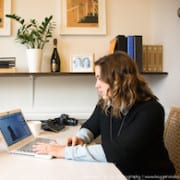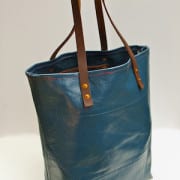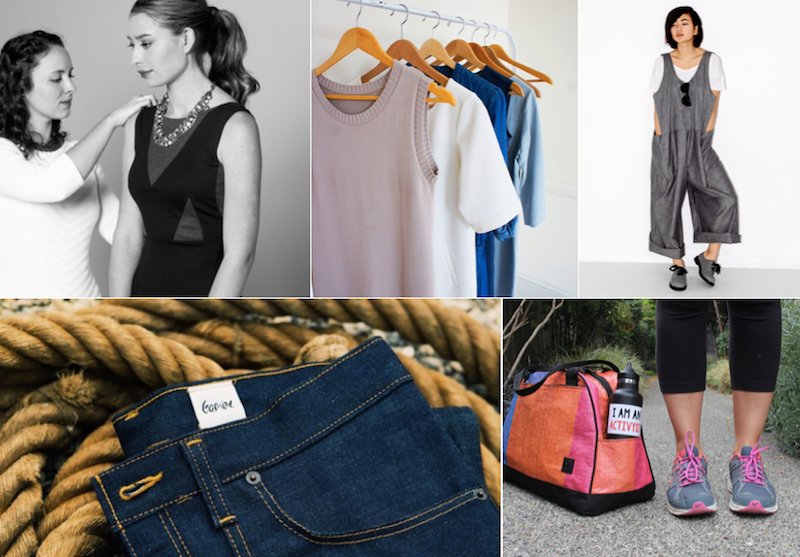6 Fashion Brands Weigh in on “What I Wish I Had Known Sooner”
One of the reasons people become “serial entrepreneurs” is because of how much you learn through the process of starting your first, or second, or even third company.
It’s easier to say what you should have known or what you wish you had known when you’re looking back.
I started Factory45 with this in mind — after going through the process of starting a sustainable clothing company with my co-founder, I realized afterwards that there were so many things I wish I had known sooner. I wanted to impart those lessons learned on other aspiring entrepreneurs so they wouldn’t have to make the same mistakes I did.
On that note, I’ve asked six designers running established fashion brands to share what they wish they had known as a young fashion startup:
 “I wish I’d known that, no matter how much you love the product, you absolutely have to ensure that: (a) you can get it produced fairly simply/easily (to avoid loss of time/sleep and potential burnout); and (b) the margins are healthy enough that you can not just sustain, but actually grow, the business (or you at least see a clear path to get the margins to that place).
“I wish I’d known that, no matter how much you love the product, you absolutely have to ensure that: (a) you can get it produced fairly simply/easily (to avoid loss of time/sleep and potential burnout); and (b) the margins are healthy enough that you can not just sustain, but actually grow, the business (or you at least see a clear path to get the margins to that place).
I also wish I had understood that startups often take time! We thought we’d be an overnight hit, and we took it hard at times when we realized it would take longer than expected. Definitely be hopeful and excited and all of that good stuff, but also be realistic.”
— Katie Rock, co-founder of Activyst
 “I wish I had known that fashion is about breaking the rules, not following them. That theory is applied to design all the time, but the business of fashion should also be about challenging the status quo, not following the calendar, not following what everyone else does and not doing as we’re told. That’s the only way change will happen in this industry and I wish I had known that sooner.”
“I wish I had known that fashion is about breaking the rules, not following them. That theory is applied to design all the time, but the business of fashion should also be about challenging the status quo, not following the calendar, not following what everyone else does and not doing as we’re told. That’s the only way change will happen in this industry and I wish I had known that sooner.”
— Tara St. James, founder of Study NY
 “I wish I had known which parts of the sampling and manufacturing process would be good for me to figure out on my own and which steps are vital to have carried out by an experienced professional. There were some things I realized I should have done myself, and a few things that would have saved me time and money in the long run had I outsourced.
“I wish I had known which parts of the sampling and manufacturing process would be good for me to figure out on my own and which steps are vital to have carried out by an experienced professional. There were some things I realized I should have done myself, and a few things that would have saved me time and money in the long run had I outsourced.
I also wish I knew that everything takes so much longer than you think it will. Both in terms of developing a product, and establishing a brand. Patience is important, but complacency is dangerous.”
— Colette Chretien, founder of La Fille Colette
 “I wish I had known how much clarity I had starting off—that I felt content and confident knowing what I was setting out to do and who I was trying to speak to. Had I taken stock of this intuition at that early stage, it would have been much easier as my audience grew to know when I’m being true to myself and the narrative I am trying to tell. Even now, as I slowly start to roll out new work, I realize that the hardest thing I have to do in this (post) post modern, socially nomadic world we live in is to just fiercely be myself.”
“I wish I had known how much clarity I had starting off—that I felt content and confident knowing what I was setting out to do and who I was trying to speak to. Had I taken stock of this intuition at that early stage, it would have been much easier as my audience grew to know when I’m being true to myself and the narrative I am trying to tell. Even now, as I slowly start to roll out new work, I realize that the hardest thing I have to do in this (post) post modern, socially nomadic world we live in is to just fiercely be myself.”
— Taylor Johnston, founder of Gamine
 “I wish I had known just how important it is to have an audience to launch to. If you want a product-based business, first start by generating a following. This could be through a blog, via Instagram or Twitter. Build up a community of people that is in-line with your future product. When you’re ready to launch you’ll have an invested group of people you can turn into customers.”
“I wish I had known just how important it is to have an audience to launch to. If you want a product-based business, first start by generating a following. This could be through a blog, via Instagram or Twitter. Build up a community of people that is in-line with your future product. When you’re ready to launch you’ll have an invested group of people you can turn into customers.”
— Jay Adams, co-founder of Brass
 “I wish I had known that finding great US manufacturing is kind of like speed dating. If it doesn’t seem like it’s going to work out, make a polite exit, but move on. Their existing operations shouldn’t have to adjust much at all to achieve the product to be produced. It should be a very close fit from the very beginning.
“I wish I had known that finding great US manufacturing is kind of like speed dating. If it doesn’t seem like it’s going to work out, make a polite exit, but move on. Their existing operations shouldn’t have to adjust much at all to achieve the product to be produced. It should be a very close fit from the very beginning.
I’ve realized over the years that in spite of a manufacturer’s best effort and enthusiasm, sometimes it wasn’t enough to get a good product at the right price point in the end. Their capabilities sometimes just didn’t match what I was trying to achieve. And as a designer I had to learn how to recognize the pitfalls early in the game to avoid a lot of wasted money time and effort.”
— Matt Mahler, founder of Skye Bags
—
Know someone who would benefit from reading these six lessons? Use the social buttons on the left of your screen to share on the platform of your choice.




